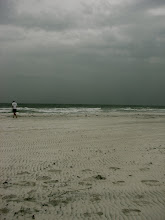I didn't start out thinking about San Blas. I started thinking about this place--where I live now--and then about Missoula, Montana and then about San Blas. They are all pretty much small towns.
Small towns--or medium-sized towns, which is more apt to Missoula and this place--can be good and they can be, yes, not so good. Familiarity breeds contempt, as they say. Seeing the same people day in and out, going about the same circles and having not so many outlets for change, surprise, stimulation--that's what's not so good. Small towns, medium-sized towns, small cities, they can become claustrophobic for sure.
I'm already tired of this place.
And as I recall, I got tired of Missoula the same way.
Now, Missoula has grown some since I and my wife lived there (as has this place) and it does have the mountains, the forests, a river and other natural amenities. Has some cool restaurants and bars and people as well. Like this place, it has a university. And I would take Missoula without a nanometer of a doubt over this place But, after a while and especially in winter (like this place) one can feel quite trapped. Hence the need to go to Mexico.
So, in 1990 or thereabouts, I went to Mexico on my own. And one place I ended up was a very small seaside town named San Blas, in Nayarit not far from Tepic, on the Atlantic coast . . . And was it a nice town? Yes it was. It was a great little town and only semi-known among the tourist trade.
I believe I've mentioned this little story once before. In Missoula, I worked at The Old Town Cafe, which is not there anymore. It was a popular place serving breakfast and lunch, diner style, and then sometimes dinner. It had a lot of regulars. I mean a lot. I waited tables and got to know those regulars, whether I wanted to or not. So, some of my escape from Missoula to Mexico was to get away from the same old faces as well as routines. Ahhhhh. I had met a guy, Francis, on the trip (Francis and I are great friends to this day). So, Francis and I were on the beach after a couple of days in San Blas and I'm having a beer and it's nice and who should walk up on that beach?
A couple of regulars from The Old Town cafe in Missoula.
That's who.
Sure they recognized me. We talked a little bit. They were a youngish couple and were going to go to Guatemala, they said. Okay. Best of luck. See you back in town.
Ah.
Well, I still had fun but that was just plain weird. Societal Claustrophobia can follow you around.
I think of all of this because winter is setting in here with its cold and dark and I'm sick of this place. I never wanted to come here but I did and many times I regret that decision. If my mother had not fallen ill--had not died at the time that she did--I may have never shown my face here to begin with despite all the serious implications that would involve . . . Anyway. Recently I was in the kitchen in a quiet house slowly putting dishes away from the dishwasher and I had to stop and think and wonder what the hell I was doing.
Why was I here?
Why didn't I just go?
This is not, was not, should not be who I am. This is not the future I thought I'd signed up for.
Yes, I have no one to blame but myself for all of that, but I have only certain ways to change it unless I want to blow up the whole paradigm. And that day in the kitchen, I was thinking of how to blow up the whole paradigm. I don't know, but something is going to have to give. Or take. Or forced.
Claustrophobia of the soul, I guess.
